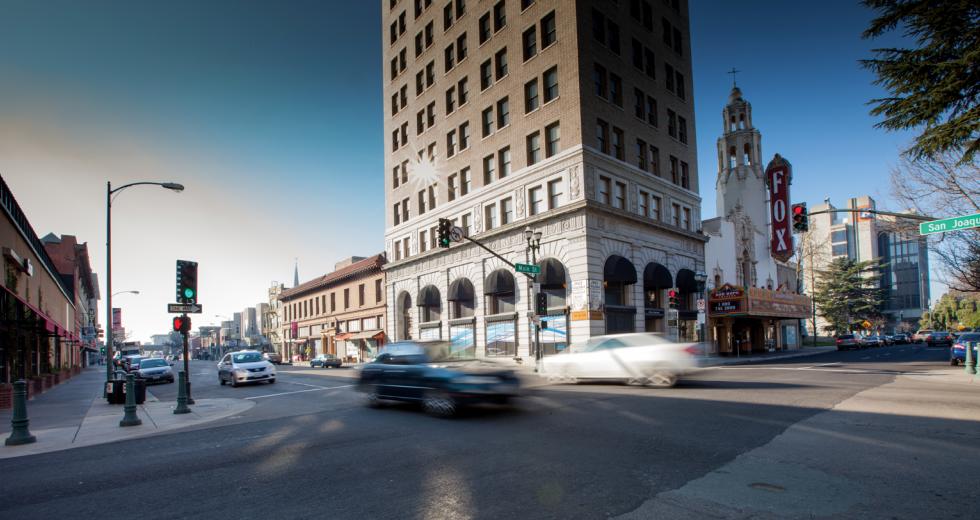Since filing for bankruptcy last year, Stockton hasn’t seen any immediate improvement. The city ended the year with 71 murders, a steady climb from only 26 in 2009. The rise has been attributed to a shrinking police force after the city slashed the department’s budget.
In fact, the bankruptcy case itself hasn’t even been given the green light to proceed. Bondholders, who stand to lose out on about $100 million, argue that they’re in the crosshairs while city workers will still collect full pensions. In objecting to the bankruptcy petition, attorneys for National Public Finance Guarantee Corp. argued that “the city failed (and in fact refused) to seek any concessions from or negotiate at all with its single largest unsecured creditor, [the California Public Employees Retirement System.”
It’s rare for a city to file for bankruptcy. Those that have done so in California tended to be small, until the city of Vallejo did it in 2008. With a population of 292,000, Stockton is about two and a half times as large.
Depending on how the case plays out, Stockton could face a lot of skepticism when it tries to take on more bond debt or tries to negotiate new benefits packages for employees. Maybe both.
More to the point, though, “If we are denied eligibility (for bankruptcy), the city will be faced with draconian cuts to all of its services,” says Moses Zapien, newly elected city councilman. He adds that the city will face additional cuts to public safety and closing libraries and other services. “It’ll mean getting Stockton off the course of success,” he says.
The city’s overall budget is about $520 million, but only about $166 million is in the General Fund, and most of that goes toward public safety.
Not all the Stockton news is bleak. The city has elected a new mayor and a couple of new council members. Its bruising unemployment rate of 17 percent at the end of the 2012 was still an improvement from the 22 percent that kicked off 2011.
The state’s new prison hospital in Stockton is expected to provide 2,400 jobs when it opens at the end of this year. Small businesses are starting to take chances again in the city’s core. Restaurateur Bruce Davies plans to shut down his Le Bistro on Benjamin Hold Drive and reopen in the old Stockton Hotel.
But those 71 murders have bolstered Stockton’s bad reputation. That makes it harder to bring in private investment dollars, says Zachary Cort, president and CEO of The Cort Group. His company specializes in infill renovation of commercial real estate.
“From the outside, people think of it as a violent city, it’s bankrupt and its being mismanaged. You can’t do anything unless your city streets are safe, and perception is many times the reality,” Cort says. “I truly hope we can get our police force back to the numbers we need to make this city safer.”
Anthony Silva, the new mayor, has proposed raising sales and utility taxes to put some money back in the police budget. The private sector, meanwhile, is taking some actions of its own. The Downtown Stockton Alliance is paying to put patrols on the street.
Out of an annual budget of $1.1 million funded by assessments of business owners, the alliance carved out $350,000 to put additional police and security patrols downtown: two full-timers during the day, plus extra patrols on weekend evenings along the waterfront.
“The private sector is the only one that has any money to put into it,” says Emily Baime, general manager of the alliance. But she says it without any tone of bitterness. She even reveals flashes of hope about City Hall: “The people interested in being bureaucrats and obstructionists are gone.”
The alliance also hopes to emulate aspects of the Sacramento Downtown Partnership’s Navigator program, which acts as a liaison between the city’s homeless population and service providers.
At some point, though, she’d like to see Stockton spending money on attracting good things that it wants, not just spending to get rid of what it doesn’t want. That’s going to be tough, especially since the state shut down California’s redevelopment agencies, she says.
“With the demise of the redevelopment agencies, Stockton can no longer spearhead those projects as it has in the past, Zapien says. The city is already revamping its Community Development Department, trying to streamline processes and fee structures. But the private sector will have to take up the torch.
“The city is going to have to take a less active role,” Zapien says. “We’re going to be shifting more toward being a facilitator. Public/private partnerships are going to be incredibly important.”
William Maxwell has seen such efforts work before. Now an archivist with Bank of Stockton, in the 1980s he owned a bookstore on Stockton’s “Miracle Mile.”
“When I opened up on Pacific Avenue in 1981, the Mile had pretty much hit its low ebb. You had one of the big indicators: You had karate schools moving into what had been big retail spaces,” Maxwell says.
The neighborhood merchants formed the Miracle Mile Improvement District, raised assessment fees to finance projects, got the city on board for traffic calming and better parking, and fought off an attempt to expand Pacific Avenue to six lanes.
It was one of the few areas of Stockton where a small business could get a short-term lease, Maxwell says. So while turnover was high, few storefronts were vacant.
“That particular area has continued to thrive even in the bad economy. It is almost starting to turn into Stockton’s gourmet ghetto with some of the restaurants that are going in,” he says. “The vacancy rate on the Miracle Mile shopping district from Harding to Castle is probably less than 5 percent.”
Stockton also has formed public safety alliances, getting help from the California Highway Patrol, the San Joaquin County Sheriff’s Office and the U.S. Marshal.
Stockton voters aren’t likely to go along with a tax increase until they see the city change its cost structure, says Jeffrey Michael, director of the Business Forecasting Center at the University of the Pacific. “It’s absolutely critical that the city get its financial house in order so businesses can see the path out. It all goes together. The private sector needs competent and sufficient public services in order to function.”
But Vallejo offers a glimpse of hope. Once it was cast off some of its financial obligations, voters were willing to pass a tax increase to improve services.
“Part of this, too, is determining what is the minimum level of public services,” says Michael Coleman, fiscal policy adviser to the League of California Cities. Some people would rather see new tax money go toward the city’s existing obligations rather than adding to them.
Michael was confident at the start of the year that the city will get its way in bankruptcy court.
“You wonder why we have a municipal bankruptcy code if a city like Stockton can’t qualify under it,” he says. But he also emphasized that the city’s General Fund is only $166 million out of a city economy of $8 billion.
That $166 million is “really darn important because it funds the community’s public safety, first and foremost,” Michael says, plus libraries and parks and other public spaces that citizens share. “But it’s not like every business in town is bankrupt. In many ways life goes on.”
Real estate renovator Cort says Stockton is indeed getting a fresh start. Or, at least, he wants to believe that it is.
“From an investment standpoint, I see great bones that just need someone to come in and care about it. We just need to build off that platform,” he says. “We’re bruised and battered right now, but I think the people of Stockton are going to stand up and be progressive.”
Getting building permits in Stockton has typically meant a battle with the city, says Cort, whose company also has done infill renovation in Long Beach, Fresno and San Diego. “But I think we are seeing things change,” he says. “People are fed up. I think the new leadership realizes you have to take the necessary steps to allow private-sector money to come into Stockton and help the city out. I think it is younger leadership. It’s people really focusing on the public/private partnerships. When you are a bankrupt city, you need to give a little bit.”
The private sector is always the first to invest, adds Doug Wilhoit, CEO of the Greater Stockton Chamber of Commerce. “Government can’t do it for everybody. The community has to stand up as a community.”
VIEW FROM THE TOP
Stockton’s new mayor takes inventory
Stockton Mayor Anthony Silva won a close race this past November, ousting incumbent Ann Johnston. He ran on a platform emphasizing safety and security, jobs, new revenue for the city and higher quality of government. Just weeks into his new job, he discusses Stockton’s path to prosperity.
Q: What is really within the powers of the mayor and City
Council to take Stockton back to prosperity?
A: I’ve gone on record as saying that there needs to be a ballot
measure to come to the public. I have proposed a half-cent sales
tax. I don’t want it to go on forever. I want it to sunset in
five to seven years. I would use that to bring in 150 to 175 new
(police) officers. Originally I wanted to include youth
employment; we have 70 gangs recruiting our kids. The gangs offer
them protection and, of course, money. Talking with people in the
city, they said they would support a tax as long as it was
earmarked for public safety. So the question is: How can we do an
initiative that would not be taken by the creditors? Another
option is if the voters pass it by two-thirds; it would be
considered a special-use tax, and it cannot be touched other than
for public safety.
Q: The private sector is already paying for extra
patrols. Are you OK with that?
A: I think that’s great. Now, certainly, when one of those
merchants calls from the Downtown (Stockton) Alliance, boom,
there’s an officer there because they are paying their salaries.
Q: Isn’t that the city’s job?
A: What price tag do you put on public safety? When they know the
city is struggling a little bit, for a business owner to step up
and help the community, I think that is a good thing. I look at
it as we are all in it together.
Q: What can you do besides raise taxes?
A: There are some things out there that can make our city better
that don’t cost any money. Just last week, we formed a police
foundation. That will be a nonprofit to which people can donate
or do fundraisers so we can help give our police the resources
they need. I am interested in this agency funding retired
officers to come back. They would be the transportation officers.
If we had a number of units on patrol in North Stockton and they
all make arrests, they are now off the street because they are at
the station. The idea would be that the retired officers would be
transporting the people to the station, leaving the regular
officer on the street. They would be paid $25 an hour, and it
wouldn’t affect their pensions because they would be working for
a nonprofit.
Q: Does city government look much different now that you
are on the inside?
A: Yes. I’m anti-bureaucracy. I’ve come from a nonprofit where
everything is quicker, too. When you come here and listen to
hours and hours of what happened in the past, you just think,
“Why were people spending money they didn’t have?” It seems like
we did a lot of projects all at once: the arena, the marina, the
parking garages, the ballpark. I am glad they are there, but they
came with a price and we will be paying for that stuff for a
while. When you come from the campaign trail, it’s exciting. But
once you get there, it’s compromise city. The first couple of
months will be trying to figure out the dynamics of the City
Council. I have talked to mayors of other cities. They talked
about what they could do and couldn’t do, and what I should do.
Here, it is unique because I am a full-time mayor and there are
positions I can appoint. There is a fine line between where the
responsibility of the city manager ends and the mayor’s begins.
Obviously, I think there is a different relationship if it is a
city manager that the mayor hired.
Q: Where will the money come from?
A: People are always talking about cutting, but they never talk
about bringing in revenue. I want to talk about
revenue-generating programs. It’s hard to stand in front of
employee groups and talk about how you have to cut this or that
and not talk about how you tried to raise funds. But I don’t
think this is the time to balance the budgets on the backs of
small business. If you look, we do have some good companies here
in Stockton. But our neighboring cities have competed as well.
Amazon just went to Patterson. I want to be out there and fight
to get them to come here. But before they will come here, they
want something done with the crime. A lot of our local businesses
are in building products, and we want to put them back to work.
Building fees have gone up about 300 percent in recent years. We
want to make Stockton a very business savvy place. We want to
reward new business owners who come back to Stockton and (offer)
some incentives for business owners who have stuck with Stockton
through tough times.
Q: Is Stockton as dangerous as people think?
A: I’m not going to sugar coat things. When people tell me about
big programs to change the national outlook on Stockton, I’m all
for it. But let’s do something first, not just window dressing. I
think things are getting better. We were averaging a homicide
every four days last year. In the beginning of this year, I
believe we have had zero homicides. I think it’s a combination of
intense police presence and the help we have gotten from the
California Highway Patrol. The faith-based community has helped a
lot. They are out there doing some night walks. I think they have
stepped up a lot. We have a good chief of police. He’s young,
he’s motivated. It’s a combination of things.
Q: If the bankruptcy isn’t allowed to go through, what
then?
A: Then we move on to Plan B. We have some stuff in place.
Q: Can you divulge any of it?
A: It’s hard. You get so many lectures from the bankruptcy
attorneys about what you can say and what you can’t. I’ll
probably get in trouble for talking to you.
— Robert Celaschi
Recommended For You

Don’t Count Me Out
Though some say it's a ghost town, citizens refuse to let Rio Vista die
The town of Rio Vista has lost gas production, lost weekend crowds of boaters and windsurfers and lost flagship hotels and Delta shoreline restaurants. But more importantly, its people have lost the notion that prosperity returns to those who stick to the status quo and wait it out.

The Auburn Advantage
How one city turned lifestyle into business leads
Downtown Auburn has a distinct, modern-day Mayberry feel, from the stone-paved sidewalks to the rustic brick bus stop. But five miles away,



